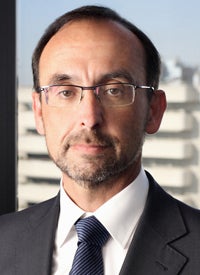Spain’s Financial Crisis
and Austerity Policy Response
Economic, Political, and Social Impact

March 28, 2016
6 p.m.
Ryan Family Auditorium
Center for Biotechnology and Life Sciences
URI Kingston Campus
There will be a panel discussion and reception following the lecture. Panelists include:
Alejandro Hazera, URI Vangermeersch Professor of Accounting
Richard McIntyre, URI professor of economics
Michael Ice, URI finance lecturer; former managing director, Merrill Lynch Europe
Silvia Dorado, URI associate professor of management
Please RSVP by March 23 if you plan to attend.
This event is free and open to the public.
Sponsors:
Office of the Provost
College of Business Administration
If you have a disability and need an accommodation, please call 401.874.2024 at least five days in advance. For TTY assistance, please call the R.I. Relay Service at 711.
Salvador Marín Hernandez, Ph.d. is president and chief executive officer of COFIDES (Compañia Española del Desarrollo “Spanish Company for the Financing of Development”). COFIDES is a major private-public sector institution which finances the establishment of innovative Spanish firms in virtually all regions of the world. It is closely affiliated with the nation’s Ministry of Commerce, operates at the near “Prime Ministerial” level, and is funded by some of the largest banks in the world (Santander, Banco de Bilbao). It is also Spain’s sovereign wealth fund.
Academically, Professor Marín is a full professor of financial accounting at the University Murcia, where he has served for well over two decades. He has published more than 100 articles on bank accounting and small business in Spain’s most prestigious journals, namely Revista Española de Contabilidad and Financiacion, as well as in international journals, which include collaborative work with URI faculty. In addition, he has authored or edited three books, including Contabilidad Bancaria (Bank Accounting), Contabilidad Bancaria en Mexico (Bank Accounting in Mexico), and Contabilidad Bancaria en el Siglo XXI (Bank Accounting in the Twenty First Century).
Given the recent financial crises in the Spanish speaking world, Professor Marin has studied the impact of financial crisis on the evolution of bank accounting and how bank accounting may impact the creation of pre-crisis “speculative bubbles.” Much of this work has been coauthored with URI accounting faculty, most notably Dr. Alejandro Hazera.
In Spain, Marín has been at the forefront of not only banking, but the development of small and medium size businesses in both Spain and Latin America. He is a major player in FAEDPYME (Fundacion Para el Analisis Estrategico de la Pequena y Mediana Empresa—Foundation for the Strategic Analysis of Small and Medium Size Enterprises), an organization which analyzes business strategies for small and medium size business all over the world, especially in Spanish-speaking countries.
Marín’s work has not only won praise from influential policy makers, but has placed him in the middle of policy making itself. In the middle 2000s, Marín was appointed to head the Region’s Economists Association. Based on his administration and research with this organization, in 2008 the governor of Murcia named Marín the minister of higher education, and later the region’s finance minister. When Spain’s financial crisis began (2009-2010), Marín was tapped to head COFIDES. This was considered a major appointment since Spain’s government recognized that the economy could only improve by increasing the nation’s entrepreneurship, innovation, and export capabilities.
During his visit, Marín will conduct a general lecture on the measures that have been taken by the Spanish government to reverse the nation’s financial crisis, the measures’ impact on Spanish society, and the sudden the appearance of new political parties, such as Podemos (a movement which preceded the U.S. “Occupy Wall Street” movement). He will also conduct “technical” lectures regarding finance, banking, and trade to classes and special audiences.
